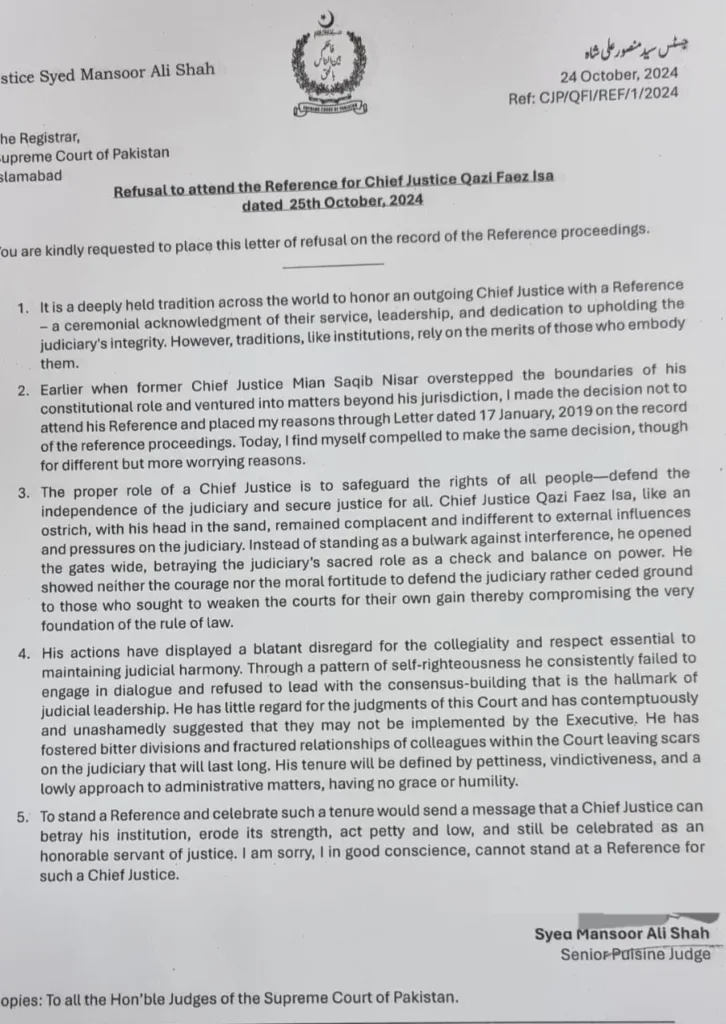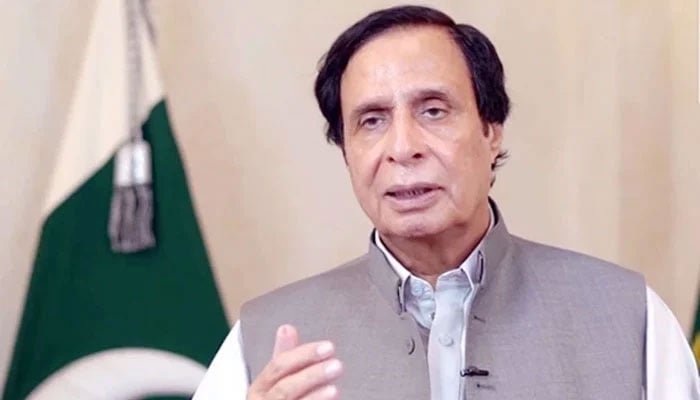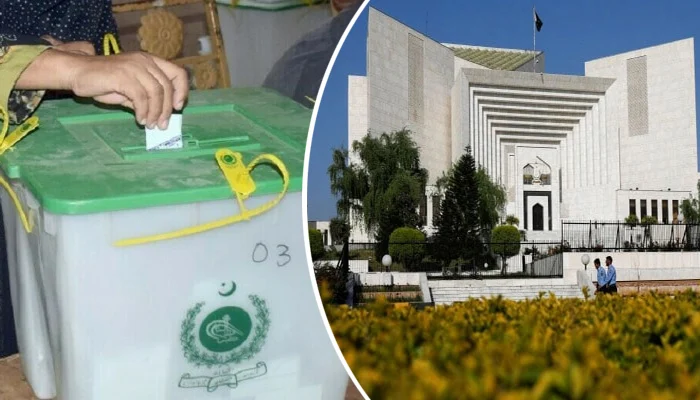In a rare public display of dissent within Pakistan’s judiciary, Justice Syed Mansoor Ali Shah declined to attend the full court reference honoring outgoing Chief Justice Qazi Faez Isa. Traditionally, a full court reference is held to celebrate the contributions and services of a Chief Justice as they retire, honoring their dedication to upholding justice and the integrity of the judiciary. However, Justice Mansoor Ali Shah’s decision to refuse attendance, along with his pointed letter criticizing the outgoing Chief Justice’s tenure, has sparked widespread debate over the judiciary’s role and the implications of internal disputes within one of Pakistan’s most respected institutions.
A Tradition of Judicial Respect
In legal systems worldwide, the full court reference has long served as a ceremonial event meant to honor an outgoing Chief Justice’s achievements and dedication. This gathering of judges, legal dignitaries, and family members provides a platform to acknowledge the Chief Justice’s contributions, leadership, and commitment to safeguarding the judiciary’s principles and independence. However, Justice Mansoor Ali Shah’s refusal to attend the reference has drawn attention to the growing concerns regarding the internal workings of Pakistan’s Supreme Court.
Justice Mansoor Ali Shah’s Strong Words
In a letter made part of the reference proceedings, Justice Mansoor Ali Shah was unreserved in his criticism of Chief Justice Qazi Faez Isa. He alleged that CJP Isa’s tenure was marred by decisions that compromised the judiciary’s strength and integrity, stating that it would be hypocritical to celebrate a Chief Justice who “betrayed his institution” and eroded its foundation. This blunt critique emphasized Shah’s belief that Isa’s actions conflicted with the role of a Chief Justice as a guardian of judicial values and impartiality.
“To stand at a Reference and celebrate such a tenure would send a message that a Chief Justice can betray his institution, erode its strength, act petty and low and still be celebrated as an honorable servant of justice. I am sorry, I in good conscience, cannot stand at a reference for such a Chief Justice,” he expressed in his letter. The bold language underlined Shah’s serious concerns over what he perceived as a compromise of judicial ideals during Isa’s leadership.
Allegations of Erosion of Judicial Integrity
Justice Mansoor Ali Shah went further, accusing Chief Justice Isa of having “compromised the very foundation of the rule of law” and betraying the judiciary’s “sacred role.” He suggested that Isa’s complacency and perceived indifference to external pressures damaged the judiciary’s integrity. His statement that Isa “like an ostrich, with his head in the sand, remained complacent and indifferent to external influences and pressure on the judiciary” highlights the gravity of his dissatisfaction with Isa’s conduct.
Past Precedents: Similar Stance on Saqib Nisar’s Tenure
This is not the first time Justice Mansoor Ali Shah has declined to attend a full court reference. During the tenure of former Chief Justice Saqib Nisar, Shah similarly refused to attend the reference, citing Nisar’s encroachment on matters outside of his judicial role. According to Shah, Nisar overstepped constitutional boundaries, venturing into political matters that should not have been within the judiciary’s purview. Shah’s repeated stance highlights a principled position that he holds regarding the role of a Chief Justice, emphasizing a belief in a clear line between the judiciary’s responsibilities and any external influences or political pressures.

Reactions from Fellow Judges
The absence of several other Supreme Court judges, including Justice Munib Akhtar, Justice Athar Minallah, Justice Ayesha Malik, and Justice Shahid Waheed, at the full court reference has raised further questions. Though none of the other judges publicly stated their reasons for non-attendance, their absence suggests a level of discontent or at least a divergence in opinion about Isa’s leadership and legacy as Chief Justice. In an institution that typically values solidarity and mutual respect, this collective absence indicates a deeper schism within Pakistan’s judiciary.
Implications for the Judiciary’s Future
Justice Mansoor Ali Shah’s criticisms raise important questions about the independence and integrity of Pakistan’s judiciary. His decision to voice his opinions publicly reflects a growing concern among some members of the judiciary about the Chief Justice’s role and the potential pitfalls of unrestrained power or outside influences. By refusing to stand in recognition of Isa’s tenure, Shah seeks to send a clear message: that a Chief Justice’s conduct must align with the highest standards of judicial independence, impartiality, and ethical conduct.
The episode has cast a spotlight on the challenges faced by Pakistan’s judiciary in maintaining cohesion amidst internal disagreements. While dissent and differing opinions are a part of any democratic institution, open criticism from senior judges signals a need for reflection on the judiciary’s leadership principles and the responsibilities of the Chief Justice. The absence of these respected figures at the full court reference serves as a powerful reminder that maintaining the judiciary’s integrity requires not only upholding justice in the public eye but also fostering respect and unity within the institution.
As Justice Qazi Faez Isa concludes his tenure, this controversy leaves the judiciary facing pressing questions about its future direction and the standards expected of its leaders. The judiciary’s continued independence and respect hinge on the principles of transparency, accountability, and respect for constitutional boundaries—values that must be safeguarded to ensure the justice system remains an unassailable pillar of Pakistan’s democracy.



